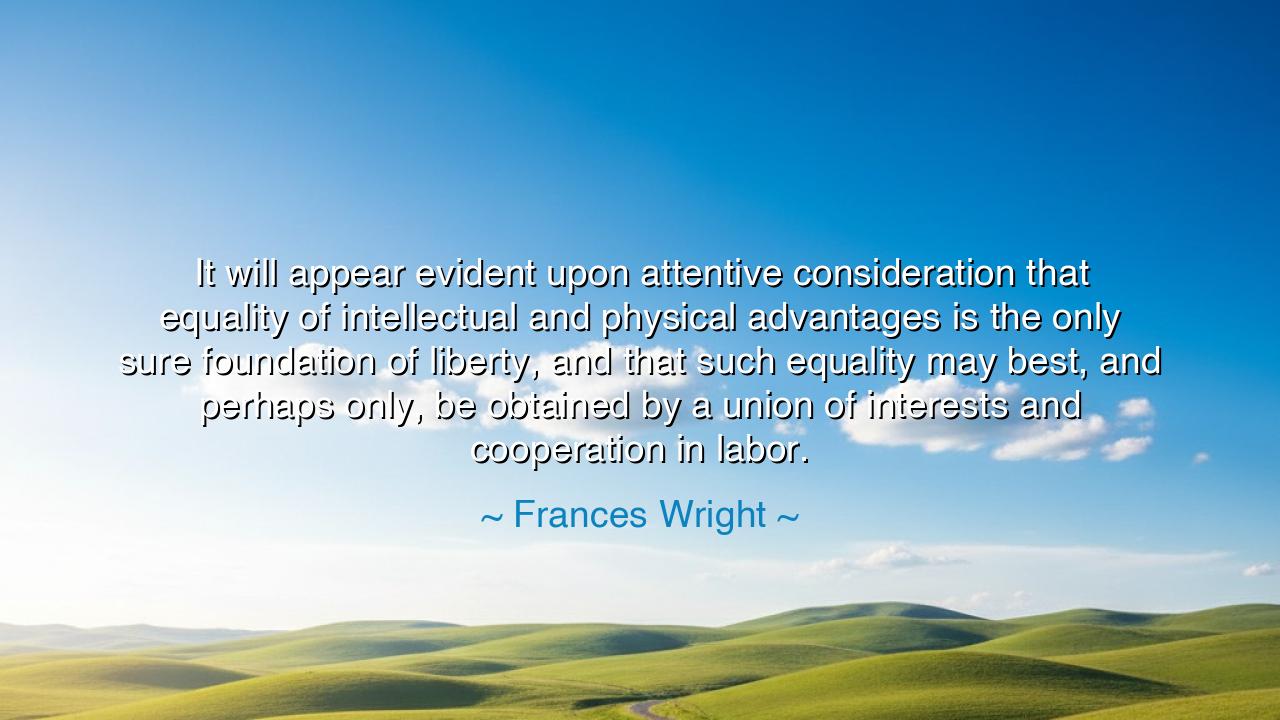
It will appear evident upon attentive consideration that equality
It will appear evident upon attentive consideration that equality of intellectual and physical advantages is the only sure foundation of liberty, and that such equality may best, and perhaps only, be obtained by a union of interests and cooperation in labor.






The fiery reformer Frances Wright, a woman ahead of her century, spoke with unwavering conviction when she declared: “It will appear evident upon attentive consideration that equality of intellectual and physical advantages is the only sure foundation of liberty, and that such equality may best, and perhaps only, be obtained by a union of interests and cooperation in labor.” These words, bold and prophetic, strike at the very heart of society’s struggle. She reminds us that liberty cannot stand upon fine speeches or hollow promises; it must be rooted in equality—equality in mind and in body, in knowledge and in sustenance, in opportunity and in strength. Without this balance, freedom is a shadow that vanishes at the first dawn of tyranny.
Frances Wright lived in the early 19th century, when slavery still scarred America, when women were silenced, when laborers toiled in poverty while a few prospered in abundance. She saw with keen vision that liberty could not flourish while ignorance and inequality reigned. If some are denied education, their voices can never carry weight. If some are starved of resources, their labor enriches only others. To her, the cry for liberty without equal advantages was but a lie, a cloak covering injustice. And so she taught that only through shared effort, through cooperation in labor, could the seeds of true freedom be planted.
Consider the story of the abolition of slavery. When the chains of bondage were broken in America, liberty was proclaimed, but equality of condition was denied. Freedmen and women were left without land, without education, without the tools to thrive. Liberty without equality proved fragile, and oppression crept back in new forms—discrimination, poverty, and injustice. Wright’s words, spoken decades earlier, became a prophecy fulfilled: without equality of intellectual and physical advantages, freedom falters, and the cry of liberty becomes hollow.
Her teaching also echoes in the story of the labor movement. In the late 19th and early 20th centuries, workers in factories and mines realized that as individuals they were powerless, but in union they had strength. By joining together, by cooperation in labor, they won shorter hours, safer conditions, and fairer wages. Their victories did not come from the charity of the powerful, but from unity of interest. Here again, Wright’s vision proved true: only when people unite, sharing their burdens and demanding fairness, can the foundation of liberty be secured.
But her words reach even deeper. She teaches us that freedom is not the right to rise above others, but the right to stand with them as equals. The union of interests she speaks of is not only in work, but in the shared destiny of humanity. When one group suffers, the freedom of all is threatened; when one group rises, the liberty of all is strengthened. To divide ourselves by class, race, or gender is to weaken the fortress of liberty; to unite in purpose is to make it unassailable.
The lesson for us is clear: guard against false liberty, the kind that proclaims freedom for some while denying it to others. True liberty demands that all be given the means to flourish—education for the mind, resources for the body, dignity in labor. If we wish to preserve freedom, we must not despise cooperation but embrace it, for it is in cooperation that we discover strength.
Practical wisdom flows from this: support systems of shared opportunity—schools that lift every child, workplaces that honor every worker, communities that bind together in mutual care. Strive not only for your own advancement, but for the equality of those around you, for in their liberation lies your own. Remember that liberty is not a solitary possession but a common inheritance, guarded only when all share in its foundation.
Thus, let the words of Frances Wright endure as both warning and guide: liberty without equality is a house built on sand. But when the people unite in purpose, when they labor together in fairness, when they raise each other in mind and body alike, then liberty becomes not a fragile dream but a fortress unshaken, standing firm for generations yet to come.






AAdministratorAdministrator
Welcome, honored guests. Please leave a comment, we will respond soon